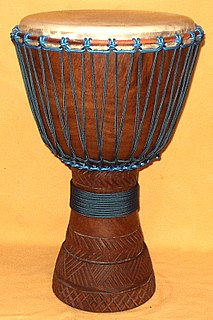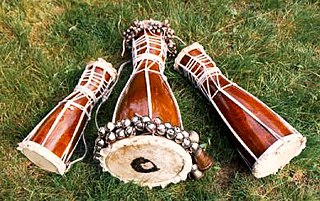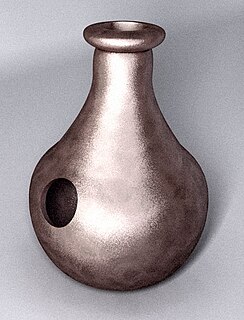
The drum is a member of the percussion group of musical instruments. In the Hornbostel-Sachs classification system, it is a membranophone. Drums consist of at least one membrane, called a drumhead or drum skin, that is stretched over a shell and struck, either directly with the player's hands, or with a percussion mallet, to produce sound. There is usually a resonant head on the underside of the drum. Other techniques have been used to cause drums to make sound, such as the thumb roll. Drums are the world's oldest and most ubiquitous musical instruments, and the basic design has remained virtually unchanged for thousands of years.

The snare is a percussion instrument that produces a sharp staccato sound when the head is struck with a drum stick, due to the use of a series of stiff wires held under tension against the lower skin. Snare drums are often used in orchestras, concert bands, marching bands, parades, drumlines, drum corps, and more. It is one of the central pieces in a drum set, a collection of percussion instruments designed to be played by a seated drummer and used in many genres of music.

Peter Edward "Ginger" Baker was an English drummer. His work in the 1960s and 1970s earned him the reputation of "rock's first superstar drummer", for a style that melded jazz and African rhythms and pioneered both jazz fusion and world music.

Michael Babatunde Olatunji was a Nigerian drummer, educator, social activist, and recording artist.

The music of Nigeria includes many kinds of folk and popular music, styles of folk music are related to the multitudes of ethnic groups in the country, each with their own techniques, instruments, and songs. Little is known about the country's music history prior to European contact, although bronze carvings dating back to the 16th and 17th centuries have been found depicting musicians and their instruments. The country's most internationally renowned genres are Indigenous, Apala, Ogene, Fuji, Jùjú, Afrobeat, Afrobeats, Igbo Highlife, Afro-juju, Waka, Igbo rap, Yo-pop, Gospel. The largest ethnic groups are the Igbo, Hausa and Yoruba. Traditional music from Nigeria and throughout Africa is almost always functional; in other words, it is performed to mark a ritual such as the wedding or funeral and not to achieve artistic goals. Although some Nigerians, especially children and the elderly, play instruments for their own amusement, solo performance is otherwise rare. Music is closely linked to agriculture, and there are restrictions on, for example, which instruments can be played during different parts of the planting season.

A djembe or jembe is a rope-tuned skin-covered goblet drum played with bare hands, originally from West Africa. According to the Bambara people in Mali, the name of the djembe comes from the saying "Anke djé, anke bé" which translates to "everyone gather together in peace" and defines the drum's purpose. In the Bambara language, "djé" is the verb for "gather" and "bé" translates as "peace."

Developed and used by cultures living in forested areas, drums served as an early form of long-distance communication, and were used during ceremonial and religious functions.

Richard John Cyril Allen is an English drummer who has played for the hard rock band Def Leppard since 1978. He overcame the amputation of his left arm in January 1985 and continued to play with the band, which went on to its most commercially successful phase. He is known as "The Thunder God" by fans. He is ranked No. 7 on the UK website Gigwise in The Greatest Drummers of All Time list.

The music of West Africa has a significant history, and its varied sounds reflect the wide range of influences from the area's regions and historical periods.

The Batá drum is a double-headed drum shaped like an hourglass with one end larger than the other. The percussion instrument is still used for its original purpose as part of traditional religious activities among the Yoruba. Batá drums have been used in the religion known as Santería in Cuba since the 1800s, and in Puerto Rico and the United States since the 1950s. Today, they are also used for semi-religious musical entertainment in Nigeria and in secular, popular music. The early function of the batá was as a drum of different gods, of royalty, of ancestors and a drum of politicians, impacting all spheres of life in Yoruba land.

Tony Oladipo Allen was a Nigerian drummer, composer, and songwriter who lived and worked in Paris, France. Allen was the drummer and musical director of Fela Kuti's band Africa '70 from 1968 to 1979, and was one of the founders of the Afrobeat genre. Fela once stated that "without Tony Allen, there would be no Afrobeat". He was described by Brian Eno as "perhaps the greatest drummer who has ever lived".

Yoruba music is the music of the Yoruba people of Nigeria, Togo, and Benin. It is perhaps best known for its extremely advanced drumming tradition, especially using the dundun hourglass tension drums. Yoruba folk music became perhaps the most prominent kind of West African music in Afro-Latin and Caribbean musical styles; it left an especially important influence on the music used in Santería practice and the music of Cuba. For a comprehensive discussion of Yoruba music, see Bode Omojola's book, Yoruba Music in the Twentieth Century.

Igbo music is the music of the Igbo people, who are indigenous to the southeastern part of Nigeria. The Igbo traditionally rely heavily on percussion instruments such as the drum and the gong, which are popular because of their innate ability to provide a diverse array of tempo, sound, and pitch. Igbo music is generally lively, upbeat, and spontaneous which creates a variety of sounds that enables the Igbo people to incorporate music into almost all the facets of their daily lives. Some very popular Igbo music styles are Igbo highlife, Igbo bongo, Odumodu.

The talking drum is an hourglass-shaped drum from West Africa, whose pitch can be regulated to mimic the tone and prosody of human speech. It has two drumheads connected by leather tension cords, which allow the player to change the pitch of the drum by squeezing the cords between their arm and body.
Ewe drumming refers to the drumming ensembles of the Ewe people of Ghana, Togo, and Benin. The Ewe are known for their experience in drumming throughout West Africa. The sophisticated cross rhythms and polyrhythms in Ewe drumming are similar to those in Afro-Caribbean music and late jazz. The original purpose of Ewe drumming were sung or performed by warriors. Now the songs and performed to celebrate or for recreational use. For example, Agbadza was originally used as a warrior dance but is now used to celebrate events.
Luciano Pozo González, known professionally as Chano Pozo, was a Cuban jazz percussionist, singer, dancer, and composer. Despite only living to age 33, he played a major role in the founding of Latin jazz. He co-wrote some of Dizzy Gillespie's Latin-flavored compositions, such as "Manteca" and "Tin Tin Deo", and was the first Latin percussionist in Gillespie's band.
Gbedu literally means "big drum" and is a percussion instrument traditionally used in ceremonial Yoruba music in Nigeria and Benin. More recently, the word has come to be used to describe forms of Nigerian Afrobeat and Hip Hop music.

The Sakara drum is one of the four major families of Yoruba drums of Nigeria. The other families are the Dundun/Gangan or talking drum, the Batá drum and the Gbedu drum. Each family includes drums of different sizes, with the mother drum playing the lead role and other drums playing in support. The Sakara is also made and used by the Hausa people of northern Nigeria.
Nyabinghi, also Nyahbinghi, Niyabinghi, Niyahbinghi, is the gathering of Rastafari people to celebrate and commemorate key dates significant to Rastafari throughout the year. It is essentially an opportunity for the Rastafari to congregate and engage in praise and worship. For example, on July 23rd of each year, a Nyabinghi is held to celebrate the birth of Emperor Haille Selassie I. During a Nyabinghi celebration men and women have different roles and expectations. Men are expected to remove any hair coverings, whilst women must keep their hair covered. A group of men typically organise themselves in a line or semi-circle and are assigned to beat the drums throughout. The remaining congregation continue to sing well known songs or 'chants', some of which are Hebraic scriptural verses that evidence the divinity of Haile Sellassie. For example, 'I have a little light in I and I'm going to make it shine, Rastafariiii, shine' and 'Holy Mount Zion is a holy place and no sinners can enter there, so let the words of my mouth and the mediation of my heart, be acceptable in thy sight, of Rastafari'. Nyabinghi is a Rastafari tradition that promotes Rastafari unity, strengthens the Rastafari spirit with fellowship and raises the conciousnes and presence of Rastafafari in the heart of those in attendance. At some points passages of the bible are read. Rastafari recognise the significance of Jesus Christ, due to Haile Sellassie I fulfilling the teachings and prophecy of scripture.

Joshua William Dun is an American musician. He is best known as half of the musical duo Twenty One Pilots, alongside Tyler Joseph, contributing drums, percussion, trumpet and backing vocals. He has also collaborated with a variety of different artists.














